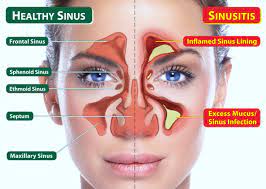Homeopathic Treatment of Sinusitis
Treatment of Sinusitis
Homeopathic Treatment of Sinusitis
Sinusitis is an inflammation, or swelling, of the tissue lining the sinuses (air cavity in facial bones of skull; there are four pairs of sinuses). Normally, sinuses are filled with air, but when sinuses become blocked and filled with fluid, germs (bacteria, viruses, and fungi) can grow and cause an infection. It may also be the result of an allergic or autoimmune reaction. An autoimmune reaction is when your immune system attacks the good parts of your body.
Conditions that can cause sinus blockage include the common cold, allergic rhinitis (swelling of the lining of the nose), nasal polyps (small growths in the lining of the nose), or a deviated septum (a shift in the nasal cavity).
Causes:
- Bacteria are the most common direct cause of acute sinusitis.
- Frequent colds
- Rapid change in temperature
- Excessive blowing of the nose
- Change in pressure in an airplane or while swimming
- Nasal allergies
- Nasal Polyps
- Nasal septum deviation
- Large adenoids and tonsils
- Abscessed or inflamed tooth
- Fungal, viral or bacterial infections
- Injury to nose or facial bones
- Asthma
Types of Sinusitis:
- Acute sinusitis: A sudden onset of cold-like symptoms such as runny, stuffy nose and facial pain that does not go away after 10 to 14 days. Acute sinusitis typically lasts 4 weeks or less.
- Subacute sinusitis: An inflammation lasting 4 to 8 weeks.
- Chronic sinusitis: A condition characterized by sinus inflammation symptoms lasting 8 weeks or longer.
- Recurrent sinusitis: Several attacks within a year.
Sinusitis can also be referred to the cavity is affects:
• Maxillary sinusitis - the patient feels pain or pressure in the cheek (maxillary) area. This can be experienced as toothache or headache.
• Frontal sinusitis - the patient feels pain and/or pressure behind or above the eyes (frontal sinus cavity). The pain will generally be experienced as headache.
• Ethmoidal sinusitis - the patient feels pain and/or pressure behind or between the eyes. Usually as in the form of a headache.
• Sphenoidal sinusitis - the patient usually feels pain or pressure in the top part (vertex) of the head
Symtoms:
Some of the primary symptoms of acute sinusitis include:
- Facial pain/pressure
- Nasal stuffiness
- Nasal discharge
- Loss of smell
- Cough/congestion
Additional symptoms may include:
- Fever
- Bad breath
- Fatigue
- Dental pain
- Acute sinusitis may be diagnosed when a person has two or more symptoms and/or the presence of thick, green, or yellow nasal discharge.
Signs and Symptoms of Chronic Sinusitis
People with chronic sinusitis may have the following symptoms for 8 weeks or more:
- Facial congestion/fullness
- A nasal obstruction/blockage
- Pus in the nasal cavity
- Fever
- Nasal discharge/discolored postnasal drainage
Additional symptoms of chronic sinusitis may include:
- Headaches
- Bad breath
- Fatigue
- Dental pain
Treatment
In the majority of cases sinusitis will resolve itself without treatment. Many patients find that home treatments provide some relief. These treatments include some OTC (over-the-counter) medications.
- Steam inhalation - You breathe in steam from a bowl of hot water - not boiling. The water may have some drops of menthol oil. Although patients do feel they experience some relief, this treatment has not been scientifically proven. Standing or sitting in a very steamy shower may sometimes provide the same effect.
- Nasal Irrigation - this is also known as sinus irrigation, sinus rinse, or sinus lavage. It is a home procedure that involves a salt water rinse to clear the nasal passages.
- Warm compress - if you apply a warm compress gently to the affected areas of your face you may have some relief of symptoms.
- Sleeping with your head raised - when you go to bed prop up some pillows so your head is higher than it usually is. This may reduce the amount of pressure around the sinuses and lower the discomfort and pain.
- Painkillers - if you take a painkiller that you would normally have to treat a headache, your fever may improve.
- Decongestant tablets - these may reduce swelling and allow the sinuses to drain.
- Decongestant sprays - these may have the same effect as tablets. However, do not use them for more than a week. The risk of making the blockage worse rises if you use decongestant sprays for prolonged periods. Ask your doctor or pharmacist for advice.
Homeopathic Treatment of Sinusitis
Homeopathy is strongly indicated in all cases of sinusitis. Homeopathic treatment helps to boosts one’s immunity towards such attacks. A constitutional homeopathic treatment can completely cure the recurrence of this disease. Homeopathic remedies facilitate drainage of mucus relieving sinus congestion, reduces inflammation in the sinuses, relieve pain and pressure by clearing the infection. It also prevents the formation of scar tissue and avoids permanent damage to the tissues lining the nose and sinuses. The constitutional approach enhances the vitality of the patient and eliminates the entire allergic predisposition hence impeding recurrent infections. Homeopathic treatment is safe and effective for both children and adults. Homeopathy can be an exceptionally successful approach in decreasing susceptibility in acute and chronic infections, as well as in treating the infection itself.
Self Care Measures
- Manage your allergies and keep away from known allergens.
- Avoid exposure to cold air.
- Reduce stress.
- Steam inhalation.
- Drink plenty of fluids.
- Use appropriate hygiene measures and avoid contact with people who have colds and other viral upper respiratory infections.
- Avoid cigarette smoke in your home and workplace.
- Consider using a humidifier.
- Use saltwater nasal washes to help keep the nasal passages open and wash out mucus and bacteria.
- Warm salt water gargles.
- Avoid blowing your nose as this may force thick mucus back into your sinuses and block them.
- Walk in open air.
